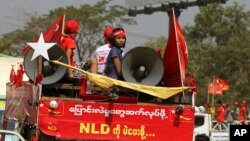Myanmar’s ruling National League for Democracy (NLD) is facing a crucial test in regional by-elections, with voters getting their first chance at the polls to judge the government’s economic performance since taking office in 2015.
The 19 seat by-elections lie mostly in NLD strongholds for seats vacated largely by incumbents who joined the government in ministerial posts.
Aung San Suu Kyi's party was swept into office with strong popular support and hopes of economic reform after years of military rule and a five year transition under former president, Thein Sein.
Worry about the economy
The by-elections come amid concerns over the pace of economic progress after the NLD rode a wave of voter support in the 2015 national elections.
Aung Zaw, editor of on-line newspaper The Irrawaddy said signs of frustration are focused on policy implementation in Myanmar – also known as Burma.
“If you look at the country, if you look at Burma, a lot of talented people, the youth population and they want to grow. And the business sector is wanting to grow but they are very disappointed. They’ve been very frustrated with the current slow pace of the government’s implementation and they feel they are being held back,” Aung Zaw told VOA.
Pace of growth disappointing
Myanmar’s economic growth slid in 2016 to around 6.5 per cent, down from international banking houses’ forecasts of over 8.0 per cent. But the World Bank, in a January report, said it remained confident of recovery in 2017.
The slower growth in 2016 was linked to consumer dampening inflation, exchange rate volatility, structural constraints and a “lack of clear economic policy” with declines in investment flows, including the impact from a slowing China economy.
Lower gas production and reduced industrial output, especially in food processing, also contributed to the lower outcome, the Bank said.
Myanmar remains an agriculture centered economy, where the sector generates 30 percent of national output and accounts for 60 percent of total employment.
Pressure on Aung San Suu Kyi
Analysts and commentators say Aung San Suu Kyi’s government faces a myriad of challenges, including electricity shortages, clarity of policy and the high cost of doing business in Myanmar.
Hong Kong-based security analysts, Steve Vickers Associates, in a report said while there was a boost in foreign investment after the lifting of economic sanctions, imposed against the former military government, they said the outlook for Myanmar's economy was uncertain.
"Aung San Suu Kyi is struggling to meet popular expectations," which the report blamed on the military's ongoing influence over the government. And while people's frustrations at present "are in abeyance, but they may rise over the coming year," the report said.
Richard Horsey, a Yangon-based business consultant, said foreign investors are hoping for greater confidence in the government and its policy direction.
Foreign direct investment (FDI) fell sharply as new real estate legislation, policy uncertainties, and “red tape” curbed interest in one of Southeast Asia’s fastest growing economies.
“A number of factors that are putting off foreign investors, which has seen foreign direct investment (FDI) dip this year compared to last year by around 30 per cent it looks like. That is quite a significant dip at a time when Myanmar is running a high trade deficit and desperately needs foreign investment to balance the books as well as to drive growth,” Horsey told VOA.
Government ministers enthusiastic
But government ministers are calling on investors to “capitalize on the opportunities,” including new investment laws geared to transparency and fairer ways to invest.
Finance and Planning Minister Kyaw Win recently told a business conference in Yangon the country was “on the right track” towards “a stronger future for both domestic and foreign business.”
He was quoted by local media as saying, “We assure you that the government will be supporting both domestic and foreign investors in their endeavours: 2018 and 2019 will be when Myanmar will truly sprint head economically.”
Officials at the March 19 event said the main sectors being targeted for investment include the oil and gas sector, electric power generation, telecommunications, manufacturing and real estate.
More disappointment in new budget
Earlier this month the parliament approved a Kt20.6 trillion (US$15.3 billion) budget, the first full budget under the NLD government.
The move was greeted with caution by analysts, with national reconciliation and peace as the main budget priorities. Allocations for education and health — seen as likely priority areas for voters — received allocations only slightly higher than previous years.
Other ministries, including planning and finance, electricity and energy and agriculture, livestock and irrigation received smaller shares than requested. The defense ministry was granted its full request of funds.
Horsey said foreign investors and business is looking to the government setting out a “compounding economic vision.”
“…To give foreign investors confidence in the economic stewardship of this government and the confidence in the direction that the government is taking this economy,” Horsey said.
World Bank official optimistic
But World Bank senior country economist Habib Rab said a positive trend is seen in a “gradual shift” in investment towards manufacturing.
“We do expect the manufacturing sector to grow, but subject to investment in [the] services sector and power sector, which would make manufacturing investment more attractive,” Rab said when the World Bank released its recent report.
Foreign investment has increased in agriculture, especially in areas such as fertilizer, seed development and animal feed.
But Aung Zaw said people in rural areas are looking for policies to boost rural incomes as well as support from the government.
“If those less [well off] people at the bottom [of the income scale] – if they start to see that they are benefiting from this government and policy, then we can say the country is moving into some sort of positive direction,” he said.




